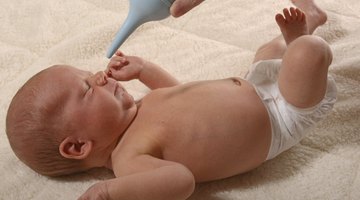Thick Green Snot From Nose in Infant
An infant with thick green snot discharging from the nose most likely has sinusitis, also known as a sinus infection.
There are several steps you can take to ease painful sinuses and provide comfort to your baby. Always consult with your baby’s doctor for a proper diagnosis and treatment of symptoms.
Identification
Thick green discharge from the nose is a common symptom of sinusitis. A sinus infection often follows a common cold. If your infant’s congestion and runny nose has lasted more than 10 days, then a sinus infection is likely present.
Other symptoms are a cough that’s worse at night, pulling on the ears, bad breath and a fever between 100 and 102 degrees Fahrenheit. Your infant’s eyelids often appear puffy and dark circles may be present under the eyes.
Cause

Home Remedies for Infant Chest Congestion
Learn More
Sinusitis is a secondary infection that’s often caused by the common cold virus — although sinus infections can also result from a bacterial or fungal infection.
Inflammation of the lining inside the nose and sinuses blocks the sinus openings so mucus doesn’t drain as normal. This blockage creates an environment inside the sinuses that’s dark, warm and moist — the perfect environment for bacteria growth. The overgrowth of bacteria results in a sinus infection. The green discharge is caused by pus filling in the sinuses.
Treatment
Purchase a salt water nasal spray and administer the spray into your infant’s nostrils. Let the spray sit for a minute and then take a rubber bulb syringe and remove excess mucus and fluid from your infant’s nose. Turn your shower onto the hottest setting and close the bathroom door. Sit in the steamy room with your infant for 15 minutes in the morning, at night and during the day.
Use the rubber bulb syringe after sitting in steam.
Use a humidifier in your baby’s room to keep the air moisturized.
If the sinus infection is persistent, your doctor will often prescribe antibiotics to be taken for two to three weeks. Breastfeed or formula feed often to dilute mucous secretions. Acetaminophen is often used to relieve painful sinuses and reduce your baby’s fever.
Prevention

Nasal Mucus in Infants
Learn More
Avoiding upper respiratory illnesses is the best way to prevent a sinus infection. Breastfeeding your infant will protect him against respiratory tract infections for several years. Ensure everyone in your household frequently washes their hands. Never allow anyone who appears sick hold your baby.
Keep your baby at home and out of public places whenever possible during cold and flu season. Do not smoke around your baby since this can irritate the upper respiratory tract and reduce the effectiveness of your baby’s developing immune system.










